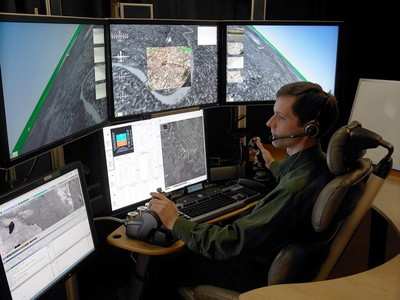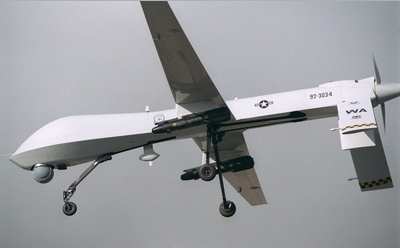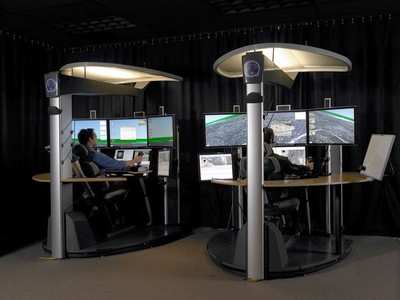Uses Technology Developed For Private Gamers
This week, Raytheon unveiled its Universal Control System (UCS)
-- a first of its kind unmanned aerial system (UAS) "cockpit" that
revolutionizes operator awareness and efficiency, while providing
the ability to control multiple unmanned aircraft, reduce potential
accidents, improve training, and decrease costs.

"We took the best-of-breed technologies from the gaming industry
and coupled them with 35-years Raytheon UAS command and control
expertise and developed a state-of-the-art universal cockpit built
around the operator," said Mark Bigham, business development
director for Raytheon's Intelligence and Information Systems
business.
"We broke down the operator's tasks and objectives and
constructed a system built entirely around them, rather than
building the system around the air vehicle first, without input
from the operators. Improvements included adding a wrap-around
display to enhance operator effectiveness. We wanted to put the
operator in the UAS 'cockpit' virtually and dramatically enhance
his or her situational awareness. UCS operators will have better
situational awareness than any manned platform, which dramatically
improves safety."
Raytheon designed and developed the UCS to meet operator demands
and decrease human factors issues when operating a UAS. The
enhanced operating system addresses ergonomic concerns and caters
to the needs of the operators to help them perform their jobs more
effectively.

In addition, the system gives the operator the option of
standing or sitting and provides flexibility in controlling
multiple functions. Moreover, the technology provides a safer work
environment for operators, keeping their minds more focused to
perform their missions more effectively and safer. The UCS system
can control multiple dissimilar UASs simultaneously, with software
designed and developed by Raytheon.
"Aircrews today need UCS superior control interfaces and
situational awareness, which will dramatically improve the combat
effectiveness of pilot and sensor operators," said Michael Keaton,
former commander of a US Air Force Predator squadron who now works
for Raytheon. "We developed the essential tools and technology
needed to bring UCS to fruition, and I believe this is the only UAS
control system on the market designed specifically around the
operator to enhance combat operations."
Raytheon developed an intuitive interface technology, which
makes UAS operators much more effective in learning the UCS system
and with significantly less training. The gaming industry has
invested billions of dollars in developing advanced human interface
technologies which are simple and intuitive; Raytheon leveraged the
technologies and adapted them to the UCS system.

A 2004 study by the Federal Aviation Administration, "A Summary
of Unmanned Aircraft Accident/Incident Data: Human Factors
Implications," states that " ... a common theme across many of the
mishaps reported involved a problem with the command interface to
the system." The study also noted that "In the systems analyzed,
human factors issues were present in 21 percent (Shadow) to 67
percent (Predator) of the accidents ... numbers suggest there is
room for improvement if specific human factors issues can be
identified and addressed."
Bigham added that Raytheon is confident that UCS will improve
operator performance statistics such as these found in this study,
and that the company looks forward to analyzing user results.
 Aero-News: Quote of the Day (04.28.25)
Aero-News: Quote of the Day (04.28.25) ANN's Daily Aero-Term (04.28.25): Decision Altitude (DA)
ANN's Daily Aero-Term (04.28.25): Decision Altitude (DA) ANN's Daily Aero-Linx (04.28.25)
ANN's Daily Aero-Linx (04.28.25) Airborne-Flight Training 04.24.25: GA Refocused, Seminole/Epic, WestJet v TFWP
Airborne-Flight Training 04.24.25: GA Refocused, Seminole/Epic, WestJet v TFWP Aero-News: Quote of the Day (04.29.25)
Aero-News: Quote of the Day (04.29.25)





